CG Historical Timeline
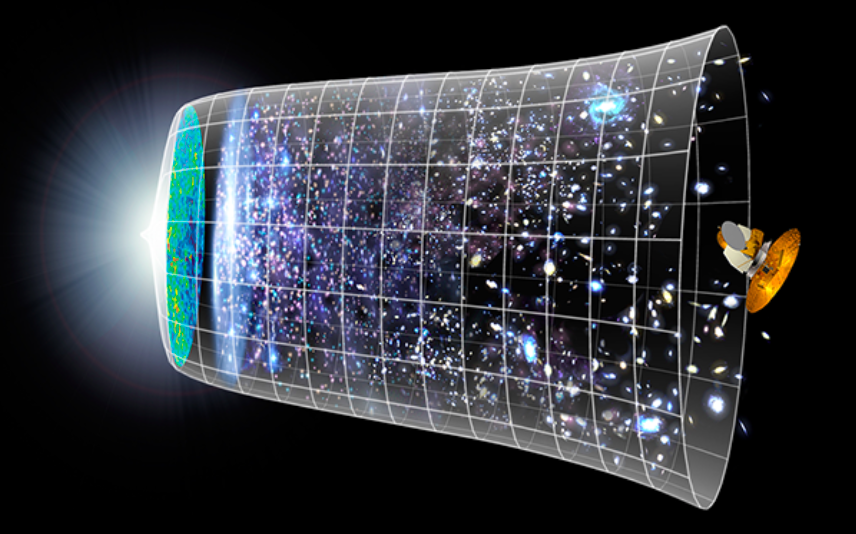
Click below to jump to the decade:
Pre-1950s
1950s
1960s
1970s
1980s
1990s
2000s
The following timeline depicts key events in the evolution of the CGI discipline. It is not exhaustive, and some of the dates are controversial, as some references give one date and others give a different date. Some dates refer to when a contribution began, and others when a contribution was made public. We have tried to determine which is the appropriate date, but for some events the records are minimal.
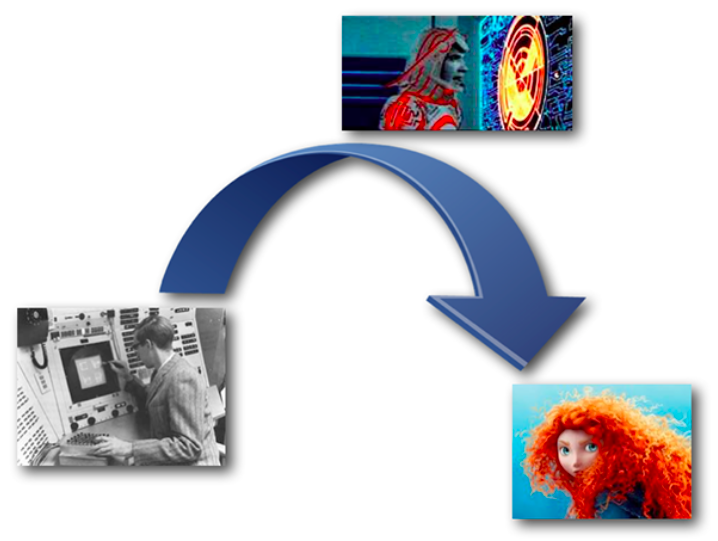
Pre-1950s
1200
- Chinese Abacus
1617
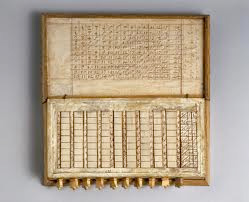
- Napier’s bones
1450
- Gutenberg press
1687
- Principia Mathematica – Isaac Newton
1801
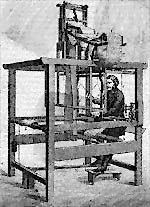
- Jacquard loom
1811
- Luddites riot
1826
- Photography (Niepce)
1830
- Babbage Analytical Engine designed
1842
- FAX (Alexander Bain)
1843
- Morse’s telegraph installed between Philadelphia and Washington
1864
- Maxwell electromagnetic wave theory becomes basis for radio wave propagation
1877
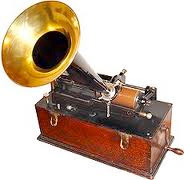
- Edison invents phonograph
1884
- Nipkow (Germany) devises scanner for scanning and transmitting images
1885
- CRT (Cathode Ray Tube)
1887
- Edison patents motion picture camera
1888
- Edison and Dickson design Kinetoscope – (motion pictures from successive photos on a cylinder)
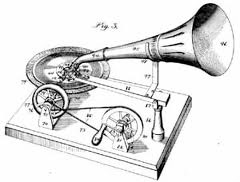
Gramaphone - Berliner invents gramophone
- Oberlin Smith publishes basics of magnetic recording
1890
- Hollerith introduces an automated punch-card driven tabulation device for the Census Bureau
1891
- Dickson uses Edison’s kinetograph to record motion pictures
1898
- Poulsen invents the Telegraphone, the first magnetic recording device
1905

- Fleming electron tube
- Einstein’s Theory of Relativity
1906
- de Forest develops Audion vacuum tube amplifier
1923
- Zworykin develops Iconoscope at Westinghouse
1926
- First television (J.L. Baird) • 1st teleconference – between Washington and New York
1927
- Philo Farnsworth invents fully electronic TV (First all-electronic TV is made by RCA in 1932)
• Motion picture film standardized at 24 fps
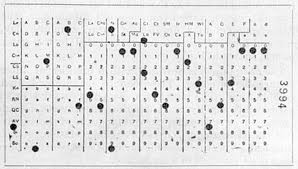
Punch Card
1928
- Hollerith introduces the 80-column “punch card”
1929
- BBC begins broadcasting
1930
- Philo Farnsworth receives patents for transmitting images by electronic means
1931
- 1st stereo recordings
1936
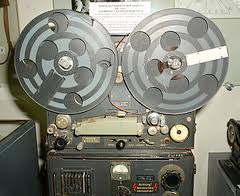
- The Magnetophone is 1st true magnetic tape recorder
1938
- Valensi proposes color TV
1939
- Bill Hewlett and Dave Packard design the Audio Oscillator
1941
- First U.S. regular TV broadcast • 1st TV commercial (for Bulova watches)
1945
- Whirlwind computer project starts at MIT
1946
- ENIAC computer built at University of Pennsylvania
1947
- Shockley, Bardeen and Brattain of Bell Labs invent transistors (“transfer resistance”)
1948
- Cable TV is installed
1949
- John Whitney enters first International Experimental Film Competition in Belgium
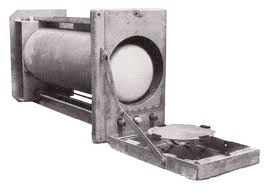
Williams Tube - Williams tube (CRT storage tube);
- Whirlwind computer built;
- Core memory developed by Wang of Harvard
1950s
1950
- Cybernetics and Society – Norbert Weiner (MIT)
- Ben Laposky uses oscilloscope to display waveforms which were photographed as artwork
1951
- Graphics display on vectorscope on Whirlwind computer in first public demonstration
1952
- Mr. Potato Head invented; later starred in Toy Story
- Air Force Project Blue Book organized to categorize UFO sightings
1953

- NTSC broadcast code
1954
- FCC authorizes color TV broadcast
- FORTRAN – John Backus
1955
- Disneyland opens
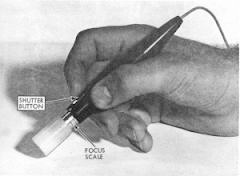
Light Pen - SAGE system at Lincoln Lab uses first light pen (Bert Sutherland)
1956
- Lawrence Livermore National Labs connects graphics display to IBM 704; use film recorder for color images
- Ray Dolby, Charles Ginsberg and Charles Anderson of Ampex develop the first videotape recorder
- Alex Poniatoff (Ampex) introduces the VR1000 videotape recorder (2″tape) – the first practical broadcast quality VTR
1957
- 1st image-processed photo at National Bureau of Standards
- Max Mathews demonstrates first computer (IBM 704) synthesis of music (Music I) at Bell Labs

DEC Logo - Digital Equipment Corporation founded
1958
- Numerical controlled digital drafting machines, APT II (Automated Programming Tools)- MIT
- CalComp 565 drum plotter
- Saul Bass creates titles for Hitchcock’s Vertigo
- Integrated circuit (IC, or Chip) invented by Jack St. Clair Kilby of Texas Instruments and Robert Noyce of Fairchild Electronics
- John Whitney Sr. uses analog computer to make art
1959
- First film recorder – General Dynamics Stromberg Carlson 4020 (uses Charactron tube)
- TX-2 computer at MIT uses graphics console
- Béla Julesz creates random-dot stereogram

Random Dot Stereogram - GM begins DAC program
1960s
1960
- William Fetter of Boeing coins the term “computer graphics” for his human factors cockpit drawings
- John Whitney Sr. founds Motion Graphics, Inc.
- LISP developed by John McCarthy
- DEC PDP-1 introduced
1961
- Spacewars, 1st video game, developed by Steve Russell at MIT for the PDP-1
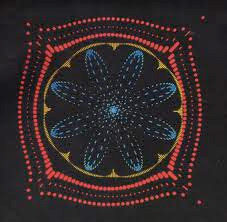
Whitney - Catalogue (John Whitney)
1962
- Information International Inc. (Triple I) founded
- Itek begins Electronic Drafting Machine project
- Mr. Computer Image ABC produced on Scanimate by Lee Harrison
1963
- 1st computer art competition, sponsored by Computers and Automation
- Sketchpad developed beginning in 1961 by Ivan Sutherland at MIT is unveiled (Ref: Sutherland, Ivan E. Sketchpad: A Man-Machine Graphical Communication System. Proceedings of the AFIPS Spring Joint Computer Conference Washington, D.C.: 1963, p. 329-346.)

Mouse - Mouse invented by Doug Englebart of SRI
- Coons’ patches
- Early computer generated film by Edward Zajac (Bell Labs)
- BEFLIX developed at Bell Labs by Ken Knowlton
- Charles Csuri makes his first computer generated artwork
- DAC-1, first commercial CAD system, developed in 1959 by IBM for General Motors is shown at JCC
- Lockheed Georgia starts graphics activity (Chase Chasen)
- Michael Noll (Bell Labs) starts his Gaussian Quadratic series of artwork
- Roberts hidden line algorithm (MIT)
- The Society for Information Display established
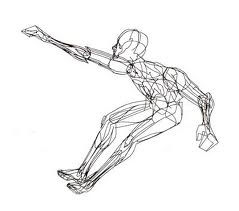
First Man - Fetter of Boeing creates the “First Man” digital human for cockpit studies
1964
- Project MAC (MIT)
- IBM 2250 console ($125,000) introduced with IBM 360 computer
- Poem Field by Stan Vanderbeek and Ken Knowlton
- Itek Digigraphic Program (later Control Data graphics system)
- The BASIC programming language developed by Kurtz and Kemeny
- Ruth Weiss introduces drawing software that performs hidden line elimination (Ref: Weiss, Ruth E. BE VISION, a Package of IBM 7090 FORTRAN Programs to Drive Views of Combinations of Plane and Quadric Surfaces. Journal of the ACM 13(4) April 1966, p. 194-204. )
- RAND tablet input device (commercially known as Grafacon)
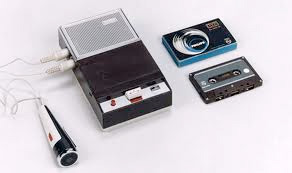
Cassette Tape Deck - Compact cassette tape (Phillips)
- New York World’s Fair
- Electronic character generator
1965
- 1st computer art exhibition, at Technische Hochschule in Stuttgart
- 1st U.S. computer art exhibition, at Howard Wise Gallery in New York
- Dolby Laboratories founded by Ray Dolby, inventor of the first videotape recorder (1956)
- Adage founded
- Roberts introduces homogeneous coordinates (Ref: Roberts, Lawrence G. 1965. Homogenous Matrix Representation and Manipulation of N-Dimensional Constructs, MS-1505. MIT Lincoln Laboratory, Lexington, Mass. )
- Utah computer science department founded
- Bresenham Algorithm for plotting lines (Ref: Bresenham, J. E. Algorithm for Computer Control of a Digital Plotter. IBM Systems Journal 4(1) 1965, p. 25-30.)
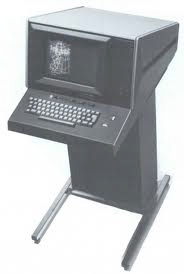
Tektronix DVST - Tektronix Direct View Storage Tube (DVST)
- CADAM developed at Lockheed; CADD developed at McDonnell Douglas
- Project DEMAND consortium (IBM, Lockheed, McDonnell Douglas, Rockwell, TRW, Rolls Royce)
- BBN Teleputer uses Tektronix CRT
1966
- Odyssey, home video game developed by Ralph Baer of Sanders Assoc., is 1st consumer CG product
- Group 1 FAX machines (using CCITT compression)
- Lincoln Wand developed
- Plasma Panel introduced (first developed at Illinois in 1964 as part of the PLATO project)
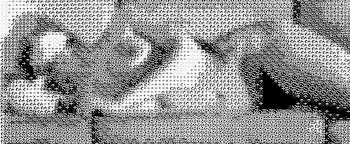
Studies in Perception - Studies in Perception I by Ken Knowlton and Leon Harmon (Bell Labs)
- MAGI founded by Phil Mittleman
- Joint Defense Department / Industry symposium on CAD/NC held in Oklahoma City
- Experiments in Art and Technology (E.A.T.) started in New York by artist Robert Rauschenberg and Bell Labs engineer Billy Klüver
- IBM awards Artist-in-Residence to John Whitney, Sr.
- Loutrel hidden line algorithm
1967
- Appel hidden line algorithm (Ref: Appel, Arthur. The Notion of Quantitative Invisibility and the Machine Rendering of Solids. Proceedings of the
- ACM National Conference 1967, p. 387-393.)
- Steven Coons publishes his surface patch “little red book” (Ref: Coons, Steven A. 1967. Surfaces for Computer-aided Design of Space Forms , Project MAC Report MAC-TR-41. Massachusetts Institute of Technology, Cambridge, Mass.)
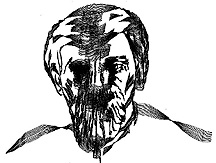
Sine Curve Man - Sine Curve Man and Hummingbird created by Chuck Csuri
- Adage real time 3D line drawing system
- Lee Harrison’s ANIMAC graphic device
- GE introduces first full color real time interactive flight simulator for NASA – Rod Rougelet
- MIT’s Center for Advanced Visual Studies founded by Gyorgy Kepes
- Instant replay and Slo-Mo introduced using Ampex HS-100 disc recorder
- Cornell’s program started in Architecture by Don Greenberg
- 1/2 inch open reel video tape recorder
1968
- DEC 338 intelligent graphics terminal
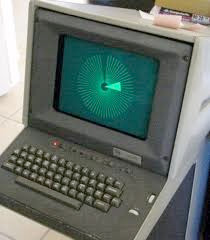
Tektronix Display - Tektronix 4010
- Intel founded
- University of Utah asks Dave Evans to form a CG department in computer science
- Warnock algorithm
- Watkins algorithm
- Edsger Dijkstra writes article Go To Statement Considered Harmful which signals beginning of structured programming
- Cybernetic Serendipity: The Computer and the Arts exhibition at London Institute of Contemporary Arts
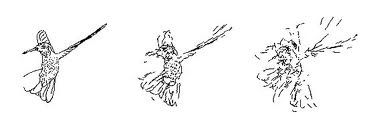
Hummingbird - Csuri’s Hummingbird purchased by Museum of Modern Art for permanent collection
- Permutations – John Whitney, Sr.
- Sutherland Head Mounted Display (Sword of Damocles), developed in 1966, shown (AFIPS Conference) (Ref: Sutherland, Ivan E. A Head-Mounted Three-Dimensional Display. Proceedings of the AFIPS Fall Joint Computer Conference Washington, D.C.: Thompson Books, 1968, p. 757-764. )
- Evans & Sutherland Calma, Computek, Houston Instrument, Imlac founded
- ARDS terminal, Computek 400 terminal
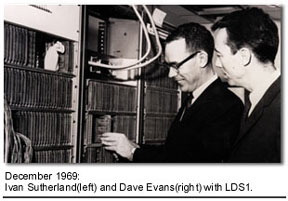
LDS-1 - LDS-1 ($250,000) from E&S introduces line clipping
1969
- Computer Image Corporation founded
- UNIX developed by Thompson and Ritchie at Bell Labs (in PDP-7 assembly code)
- SCANIMATE commercialized – Lee Harrison
- Genesys animation system – Ron Baecker
- GRAIL (Graphics Input Language) developed at Rand
- Computer Space arcade game built by Nolan Bushnell
- Xerox PARC founded
- Lee Harrison’s CAESAR animation system
- Bell Labs builds first framebuffer (3 bits)
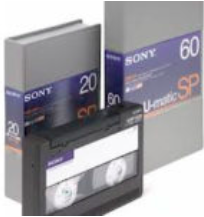
U-matic Tape - Sony U-Matic 3/4″ video cassette
- Intel introduces the 1 KB RAM chip
- 1st use of CGI for commercials – MAGI for IBM
- Graphical User Interface (GUI) developed by Xerox (Alan Kay)
- SIGGRAPH formed (began as special interest committee in 1967 by Sam Matsa and Andy vanDam)
- ComputerVision, Applicon, Vector General founded
- ARPANET is born
1970s
1970
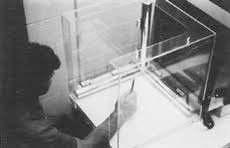
- Sonic Pen 3-D input device
- ISSCO (Integrated Software Systems Corporation ) founded (marketed DISSPLA software) by Peter Preuss
- Watkins algorithm for visible surfaces
- Lillian Schwartz produces Pixellation at Bell Labs
- Pascal programming language developed by Wirth
- Imlac PDS-1 programmable graphics computer marketed
- John Staudhammer starts NCSU Graphics Lab at NC State
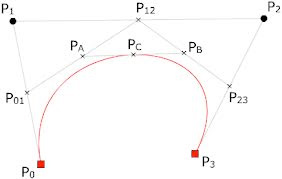
Bezier Curve - Pierre Bezier from Renault develops Bezier freeform curve representation
1971
- Gouraud shading (Ref: Gouraud, Henri. Continuous Shading of Curved Surfaces. IEEE Transactions on Computers C-20(6), June 1971, p. 623-29. )
- Ramtek founded
- GINO (graphics input output specification) – Cambridge University
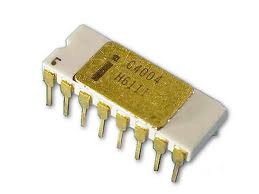
Intel 4004 - Intel 4004 4-bit processor
- Interactive Graphics for Computer-Aided Design (Prince) published
- MCS (Manufacturing and Consulting Services) founded by Patrick Hanratty, considered the “father” of mechanical CAD/CAM – introduces ADAM
- CAD software, which is the heart of many modern software systems
- Robert Abel and Associates founded
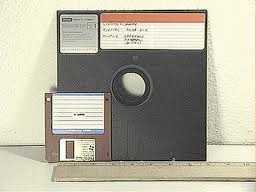
Floppy Disk - Floppy disk (8″) – IBM
1972
- MAGI Synthevision started
- CGRG founded at Ohio State
- NASA IPAD (Integrated Program for Aerospace Vehicle Design) initiative started
- Graphics Standards Planning Committee organized by ACM-SIGGRAPH
- The @ symbol selected for email addresses by BBN
- C language developed by Ritchie
- Emmy awarded to Lee Harrison for SCANIMATE
- Alto computer introduced by Xerox PARC (Alan Kay)

Intel 8008 - Intel 8008 8-bit processor
- Megatek, Summagraphics, Computervision, Applicon founded
- Utah hand (Catmull) and face (Parke) animations produced (Ref: Catmull, Edwin. A System for Computer Generated Movies. Proceedings of the ACM National Conference August 1972, p. 422-431. and Parke, Frederic I. Computer Generated Animation of Faces. Proceedings of the ACM National Conference 1972, p. 451-457.)
- Computer Graphics and Image Processing journal begins publication
- 8-bit frame buffer developed by Dick Shoup at Xerox PARC
- Sandin Image Processor – Dan Sandin, Univ. Illinois-Chicago Circle
- Atari formed (Nolan Bushnell)
- Newell, Newell and Sancha visible surface algorithm (Ref: Newell, M. E., R. G. Newell and T. L. Sancha. A Solution to the Hidden Surface Problem. Proceedings of the ACM National Conference 1972, p. 443-450)
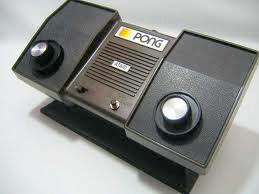
Pong - Video game Pong developed for Atari
- Graphics Symbiosis System (GRASS) developed at Ohio State by Tom DeFanti
1973
- E&S begins marketing first commercial frame buffer
- Ethernet – Bob Metcalf (Harvard)
- Quantel founded
- Westworld – uses 2D graphics
- Circle Graphics Habitat founded at Univ. Illinois Chicago (Tom DeFanti & Dan Sandin)
- Moore’s Law (the number of transistors on a microchip will double every year and a half) by Intel’s chairman, Mr. Gordon Moore
- Nolan Bushnell’s video game Computer Space appears in movie Soylent Green
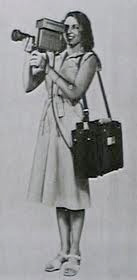
Portapak - First SIGGRAPH conference (Boulder)
- 3/4 inch Portapack replaces 16mm film for news gathering
- Richard Shoup develops PARC raster display
- Rich Riesenfeld (Syracuse) introduces b-splines for geometric design (Ref: R.F. Riesenfeld. Applications of B-Spline Approximation to Geometric Problems of Computer Aided Design. PhD Dissertation, Syracuse University , 1973. )
- Principles of Interactive Computer Graphics (Newman and Sproull) first comprehensive graphics textbook is published
1974
- Motion Pictures Product Group formed at III by John Whitney, Jr. and Gary Demos
- Alex Schure opens CGL at NYIT, with Ed Catmull as Director
- Barnhill and Riesenfeld introduce the name “Computer-Aided Geometric Design” (CAGD)
- SuperPaint developed by Dick Shoup and Alvy Ray Smith
- TCP protocol (Vint Cerf, Bob Kahn)
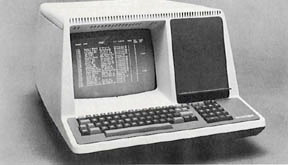
VT 52 - DEC VT52 incorporated the first addressable cursor in a graphics display terminal
- Intel (Zilog) 8080
- Z-buffer developed by Ed Catmull (University of Utah) (Ref: E. Catmull. A Subdivision Algorithm for Computer Display of Curved Surfaces, Ph.D. Thesis, Report UTEC-CSc-74-133, Computer Science Department, University of Utah, Salt Lake City, UT, 1974)
- Futureworld (sequel to Westworld) uses 3D CGI (III)
- Hunger/La Faim produced by Peter Foldes at National Research Council of Canada; wins Cannes Film Festival Prix de Jury award for animation
1975
- Phong shading – Bui-Toung Phong (University of Utah) (Ref: Bui-Tuong, Phong. Illumination for Computer Generated Pictures. Communications of the ACM 18(6) June 1975, p. 311-317.)
- Sony Betamax recorder
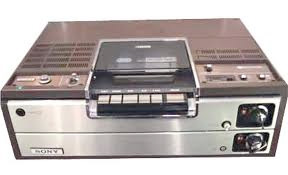
Betamax - USAF ICAM (Integrated Computer Aided Manufacturing) initiative started
- Cray 1 introduced
- Altair 8800 computer
- fractals – Benoit Mandelbrot (IBM)
- Winged edge polyhedra representation (Bruce Baumgart)
- Catmull curved surface rendering algorithm (Ref: Catmull, Edwin. Computer Display of Curved Surfaces. Proceedings of the IEEE Conference on Computer Graphics, Pattern Recognition and Data Structures (IEEE Cat. No. 75CH0981-1C) 1975, p. 11-17. )
- Bill Gates starts Microsoft
- Quantel (QUANtized TELevision) introduces the DFS3000 Digital Framestore

Teapot - Martin Newell (Utah) develops CGI teapot (physical teapot now in the Computer Museum in Boston)
- JPL Graphics Lab developed (Bob Holzman)
- Arabesque completed (John Whitney)
- Anima animation system developed at CGRG at Ohio State (Csuri)
1976
- MITs Visible Language Workshop founded by Muriel Cooper
- Ed Catmull develops “tweening” software (NYIT)
- Jim Clark’s Hierarchical model for visible surface detection [Ref: J. H. Clark. Hierarchical geometric models for visible surface algorithms. Communications of the ACM, 19(10):547– 554, 1976.)
- N. Burtnyk , M. Wein, Interactive skeleton techniques for enhancing motion dynamics in key frame animation, CACM, V19, #10, Oct 1976, 564-569
Dolby sound - Jim Blinn develops reflectance and environment mapping (University of Utah)
- Nelson Max’s sphere inversion film
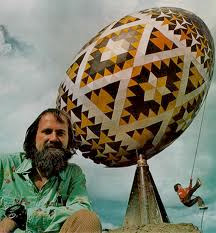
Pysanka - Ukrainian Pysanka Egg erected in Vegraville, Canada by Ron Resch (University of Utah) to commemorate the RCMP
- Sony Beta home video
- Floppy disk (5 1/4″)
- Apple 1 (Wozniak)
- IFIP (The International Federation of Information Processing) conference at Seillac in France on “The Methodology of Computer Graphics” begins standardization process
- Computer Graphics Newsletter started by Joel Orr; becomes Computer Graphics World in 1978
- Peter Fonda’s head digitized and rendered by III for Futureworld
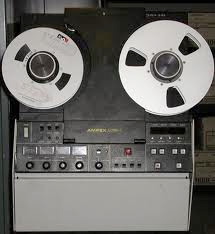
VPR-1 - Ampex VPR-1 Type C 1″ video recorder
- Wang word processing
- Artist and Computer, by Ruth Leavitt
- Mathematical Elements for Computer Graphics (David Rogers) published
- Steve Jobs and Steve Wozniak start Apple computer.
1977
- Apple Computer incorporated
- VHS (Video Home System) format – Matsushita
- JVC VHS home video
- Apple II released
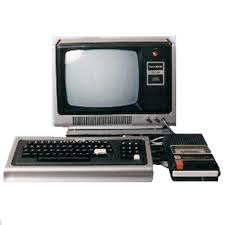
TRS-80 - TRS-80 introduced
- Frank Crow introduces antialiasing (Ref: Franklin C. Crow, The aliasing problem in computer-generated shaded images, Communications of the ACM, v.20 n.11, p.799-805, Nov. 1977 )
- Jim Blinn introduces a new illumination model that considers surface “facets” (Ref: Models of light reflection for computer synthesized pictures, James F. Blinn , Proceedings of the 4th annual conference on Computer graphics and interactive techniques July 1977, V11, #2, pp192-198)
- Computer Graphics World begins publication (started by Joel and N’omi Orr as Computer Graphics Newsletter)
- Academy of Motion Pictures Arts and Sciences introduces Visual Effects category for Oscars
- Nelson Max joins LLL
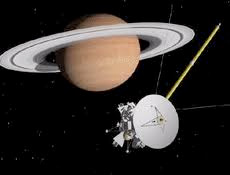
Blinn animation - Jim Blinn joins JPL
- R/Greenberg founded (Richard and Robert Greenberg)
- SIGGRAPH CORE Graphics standard
- Ampex ESSTM (Electronic Still Store) system introduced for network sports slo-mo;adapted for use as animation sequential storage device
- GKS (Graphical Kernal System) graphics standard introduced
- Fuchs multiprocessor visible surface algorithm (Ref: Fuchs, Henry. Distributing A Visible Surface Algorithm Over Multiple Processors. Proceedings of the ACM National Conference 1977, p. 449-451. )
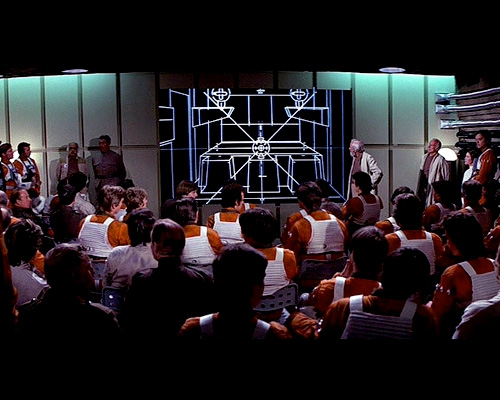
Cuba graphics - Larry Cuba produces Death Star simulation for Star Wars using Grass at UICC developed by Tom DeFanti at Ohio State
1978
- Tom DeFanti’s GRASS system rewritten for Bally home computer (Zgrass)
- E&S goes public
- AT&T and Canadian Telidon introduce videotex graphics standard (NAPLPS)
- Digital Effects founded (Judson Rosebush, Jeff Kleiser, et al)
- Lance Williams curved shadows paper (Ref: Lance Williams, Casting curved shadows on curved surfaces, Proceedings of the 5th annual conference on Computer graphics and interactive techniques, p.270-274, August 23-25, 1978 )
- Ikonas frame buffer – England/Whitton
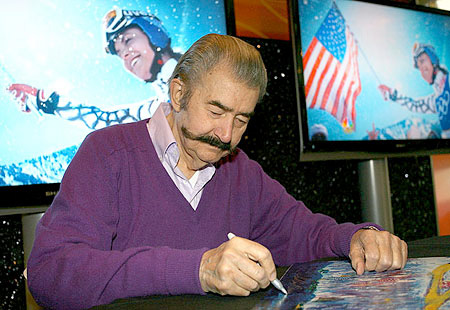
Leroy Nieman - Leroy Neiman uses Ampex AVA-1TM video art system to draw (on air) football players in Super Bowl XII
- 1st CGI film title – Superman (R. Greenberg)
- Computer Graphics World begins publication
- James Blinn produces the first of a series of animations titled The Mechanical Universe
- DEC VAX 11/780 introduced
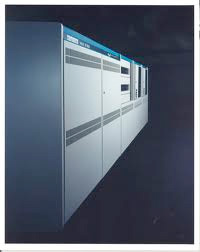
VAX 11-780 - Video laser disc
- Bump mapping introduced (Blinn) (Ref: Simulation of wrinkled surfaces, James F. Blinn, Proceedings of the 5th annual conference on Computer graphics and interactive techniques August 1978, V12, #3, pp 286-292.)
1979
- National Computer Graphics Association (NCGA) organized by Peter Preuss of ISSCO and Joel Orr
- IGES graphics file format specified

IBM 3279 - IBM 3279 color terminal
- E&S PS-300
- Motorola 68000 32-bit processor
- Atari 8-bit computers introduced
- Disney produces The Black Hole using CGI for the opening
- Sunstone – Ed Emshwiller (NYIT)
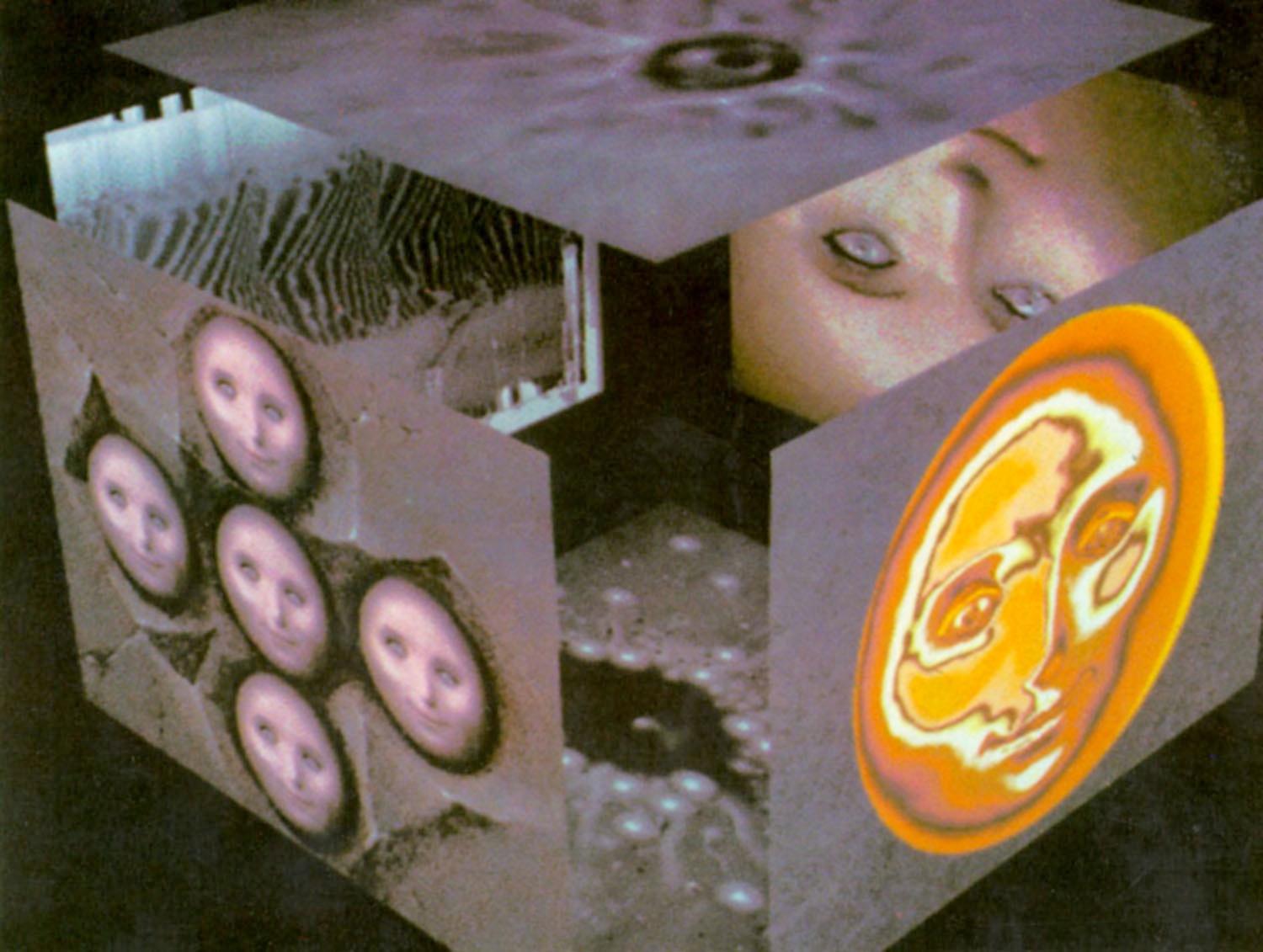
Frame from Sunstone - George Lucas hires Ed Catmull, Ralph Guggenheim and Alvy Ray Smith to form Lucasfilm
1980s
1980
- Vol Libre – Loren Carpenter of Boeing
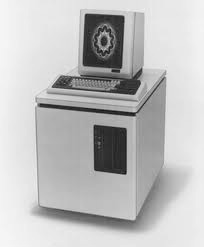
Apollo Computer - Apollo Computer founded – introduces the 68000 based DN100 workstation
- Turner Whitted of Bell Labs publishes ray tracing paper (Ref: Turner Whitted, An improved illumination model for shaded display, Communications of the ACM, v.23 n.6, p.343-349, June 1980 )
- First NCGA conference – Arlington, Virginia – Steven Levine, President
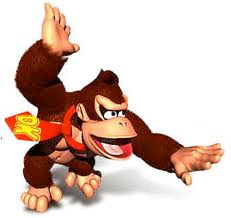
Donkey Kong - Donkey Kong introduced by Nintendo (Mario named in US release)
- IBM licenses DOS from Microsoft
- Apple Computer IPO – 4.6M shares @ $22
- Aurora Systems founded by Richard Shoup
- SIGGRAPH Core standard reorganized as ANSC X3H3.1 (PHIGS)
- EUROGRAPHICS (The European Association for Computer Graphics) formed; first conference at Geneva
- Disney contracts Abel, III, MAGI and DE for computer graphics for the movie Tron
- MIT Media Lab founded by Nicholas Negroponte
- Pacific Data Images founded by Carl Rosendahl
- Computer hard disk drive – Seagate
- Hanna-Barbera, largest producer of animation in the U.S., begins implementation of computer automation of animation process
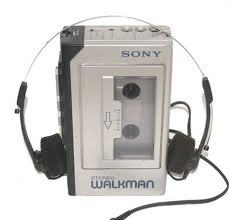
Walkman - Sony Walkman
- Quantel introduces Paintbox
1981
- Sony Betacam
- Tom DeFanti expands GRASS to Bally Z-50 machine (ZGRASS) – University Illinois – Chicago Circle
- IBM introduces the first IBM PC (16 bit 8088 chip)
- DEC introduces VT100
- IEEE Computer Graphics and Applications published by IEEE Computer Society and NCGA
- Ampex ADO® system introduced; garners an Emmy award in 1983
- Digital Productions formed by Whitney and Demos
- Cranston/Csuri Productions founded by Chuck Csuri, Robert Kanuth and Jim Kristoff.
- R/Greenberg opens CGI division (Chris Woods)
- MITI Fifth Generation Computer Project announced by Japanese Ministry of International Trade and Industry
- REYES renderer written at LucasFilm
- Penguin Software (now Polarware) introduces the Complete Graphics System
- Looker includes the virtual human character Cindy (Susan Dey) – 1st film with shaded graphics(III)
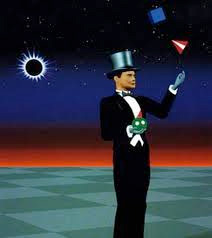
Adam Powers - Adam Powers, the Juggler produced by III
- Carla’s Island – Nelson Max
1982
- The Last Starfighter (Digital Productions) begins production
- Tron released
- The Geometry Engine (Clark) (Ref: Clark, James H. The Geometry Engine: A VLSI Geometry System for Graphics. Computer Graphics (SIGGRAPH 82 Proceedings) 16(3) July 1982, p. 127-133.)
- Jim Clark founds Silicon Graphics Inc.
- Sun Microsystems founded (sun := Stanford University Network)
- Alain Fournier , Don Fussell , Loren Carpenter, Computer Rendering of Stochastic Models. Communications of the ACM, v.25 n.6, p.371-384, June 1982 (Fractal Rendering paper)
- Skeleton Animation System (SAS) developed at CGRG at Ohio State (Dave Zeltzer)
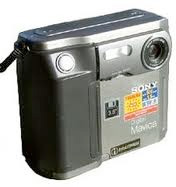
Mavica - Sony still frame video camera (Mavica)
- ACM begins publication of TOG (Transactions on Graphics)
- Tom Brighham develops morphing (NYIT)
- Adobe founded by John Warnock
- Toyo Links established in Tokyo
- Quantel Mirage
- Symbolics Graphics Division founded
- EPCOT Center opens
- Atari develops the data glove.
- Where the Wild Things Are test (MAGI) – digital compositing used to combine CG backgrounds and traditional animation
- AutoDesk founded; AutoCAD released
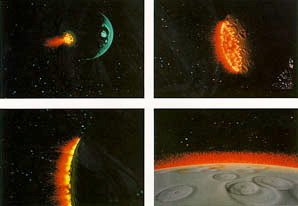
Frames from the Genesis Effect - ILM computer graphics division develops “Genesis effect” for Star Trek II – The Wrath of Khan
1983
- Particle systems (Reeves – Lucasfilm) (Ref: Reeves, William T. Particle Systems: A Technique for Modeling a Class of Fuzzy Objects. Computer Graphics (SIGGRAPH 83 Proceedings) 17(3) July 1983, p. 359-376. )
- SGI IRIS 1000 graphics workstation
- Non-Uniform Rational B-Splines (NURBS) introduced by Tiller (Note: this date is somewhat misleading, since the concept built on the work of Vesprille (1975), Riesenfeld (1973), Knapp (1979), Coons (1968) and Forrest (1972))
- Road to Point Reyes created – Lucasfilm
- The Last Starfighter released
- Jim Blinn receives the first (1983) ACM SIGGRAPH CG Achievement Award
- Ivan Sutherland receives the first (1983) ACM SIGGRAPH Steven A. Coons Award
- Steve Dompier’s “Micro Illustrator”
- UNIX System V
- Utah Raster Toolkit introduced (Spencer Thomas)
- Autodesk introduces first PC-based CAD software
- Alias founded in Toronto by Stephen Bingham, Nigel McGrath, Susan McKenna and David Springer
mip-mapping introduced for efficient texture mapping (Williams – NYIT) (Ref: Williams, Lance. Pyramidal Parametrics. Computer Graphics (SIGGRAPH 83 Proceedings) 17(3) July 1983, p. 1-11.
Sony CD Player - Sony and Philips introduce 1st CD player
- Wacom Co., Ltd started in Japan
1984
- Robert Abel & Associates produces the 1st computer generated 30 second commercial used for Super Bowl (Brilliance)
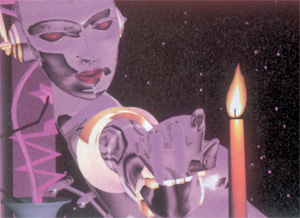
Scene from Brilliance - Wavefront Technologies is the first commercially available 3D software package (founded by Mark Sylvester, Larry Barels and Bill Kovacs )
- Thomson Digital Image (TDI) founded
- Jim Clark receives the 1984 ACM SIGGRAPH CG Achievement Award
- International Resource Development report predicts the extinction of the keyboard in the next decade
- A-buffer (or alpha-buffer) introduced by Carpenter of Lucasfilm
- Distributed ray tracing introduced by Lucasfilm (Ref: Cook, Robert L., Thomas Porter and Loren Carpenter. Distributed Raytracing. Computer Graphics (SIGGRAPH 84 Proceedings) 18(3) July 1984, p. 137-145. )
- Cook shading model (Lucasfilm) (Ref: Cook, Robert L. Shade Trees. Computer Graphics (SIGGRAPH 84 Proceedings) 18(3) July 1984, p. 223-231. )
- 14.5 minute computer generated IMAX film (The Magic Egg) shown at SIGGRAPH 84 – 18 teams; 20 segments
- Universal Studios opens CG department
- First Macintosh computer is sold; introduced with Clio award winning commercial 1984 during Super Bowl
- McDonnel Douglas introduces the Polhemus 3Space digitizer and body Tracker
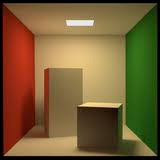
Cornell Box - The Cornell Box invented by Cohen
- Radiosity born – Cornell University (Ref: Goral, Cindy M., Kenneth E. Torrence, Donald P. Greenberg and Bennett Battaile. Modeling the Interaction of Light Between Diffuse Surfaces. Computer Graphics (SIGGRAPH 84 Proceedings) 18(3) July 1984, p. 213-222. )
- John Lasseter joins Lucasfilm
- Motorola 68020
- Digital Productions (Whitney and Demos) get Academy Technical Achievement Award for CGI simulation of motion picture photography
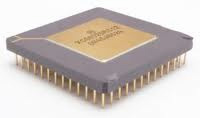
Motorola 68020 - Lucasfilms introduces motion blur effects
- Porter and Duff compositing algorithm (Lucasfilm) (Ref: Porter, Thomas and Tom Duff. Compositing Digital Images. Computer Graphics (SIGGRAPH 84 Proceedings) 18(3) July 1984, p. 253-259.)
- The Adventures of Andre and Wally B. (Lucasfilm)
1985
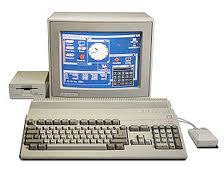
- Commodore launches the new Amiga
- Loren Carpenter receives the 1985 ACM SIGGRAPH CG Achievement Award
- Pierre Bezier receives the 1985 ACM SIGGRAPH Steven A. Coons Award
- Sogitec founded (Xavier Nicolas)
- Max Headroom – computer-mediated live action figure
- Judson Rosebush Co. started
- Abel Image Research takes Robert Abel & Associates to shaded graphics business
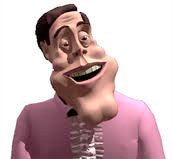
Tony De Peltrie - Tony de Peltrie airs
- stereo TV
- Biosensor (Toyo Links)
- Cray 2
- GKS standard
- Quantel Harry is first non-linear editor
- UNIX X10R1
- CGW predicts 90s graphics workstation
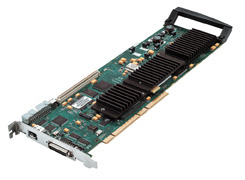
Targa - Targa 16 board (AT&T) goes to market
- Pixar Image Computer goes to market
- NeXT Incorporated founded by Steve Jobs and five former Apple senior managers
- Perlin’s noise functions introduced (Ref: Perlin, Ken. An Image Synthesizer. Computer Graphics (SIGGRAPH 85 Proceedings) 19(3) July 1985, p. 287-296.)
- CD-ROMs High Sierra (ISO9660) standard introduced
- PostScript (Adobe – John Warnock)
- PODA creature animation system developed by Girard and Maciejewski at Ohio State (Ref: Girard, Michael and A. A. Maciejewski. Computational Modeling for the Computer Animation of Legged Figures. Computer Graphics (SIGGRAPH 85 Proceedings) 19(3) July 1985, p. 263-270.)
- Boss Films founded by Richard Edlund
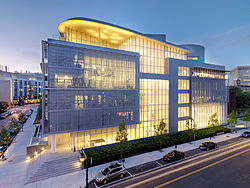
Media Lab - MIT Media Lab moves to new home
- Young Sherlock Holmes stained glass knight (Lucasfilm), 2010 (Boss Films)and Looker (DP)
1986
- The Great Mouse Detective was the first animated film to be aided by CG.
- Pixar purchased from Lucasfilm by Steve Jobs
- X-Window System (MIT Project Athena)
- Trancept Systems founded by Nick England and Mary Whitton – graphics board for Sun
- CGI group starts at Industrial Light and Magic (Doug Kay and George Joblove)
- Softimage founded by Daniel Langlois in Montreal
- Sun Microsystems goes public
- mental images founded in Berlin
- Computer Associates acquires ISSCO
- Microsoft goes public (IPO raises $61M; share prices go from $21 to $28)
- Apple IIgs introduced
- Silicon Graphics Incorporated IPO
- SGI IRIS 3000 (MIPS processor)
- Turner Whitted receives the 1986 ACM SIGGRAPH CG Achievement Award
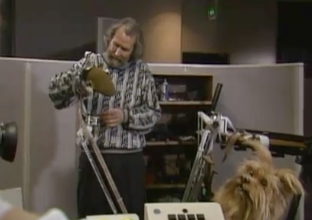
Jim Henson – Waldo - Jim Henson Waldo project introduces motion capture (Digital Productions)
- Kajiya’s Rendering Equation (Ref: Kajiya, James T. The Rendering Equation. Computer Graphics (SIGGRAPH 86 Proceedings) 20(4) August 1986, p. 143-150.)
- Omnibus assumes Robert Able & Associates and Digital Productions in hostile takeovers by John Pennie and investors
- Whitney/Demos Productions founded
- Intel introduces 82786 graphics coprocessor chip ; Texas Instruments introduces TMS34010 Graphics System Processor
- NSFNet
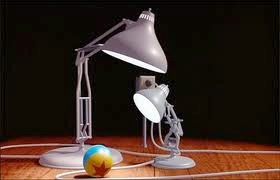
Luxo Jr. - Luxo Jr. nominated for Oscar (first CGI film to be nominated – Pixar)
- TIFF (Aldus)
- Scitex founded for prepress
1987
- GIF format (CompuServe), JPEG format (Joint Photographic Experts Group)
- Willow (Lucasfilm) popularizes morphing
- Max Headroom debuts
- LucasArts formed
- Adobe Illustrator
- CGM (Computer Graphics Metafile) standard
- Side Effects Software established
- VGA (Video Graphivs Array) invented by IBM
- Windows 2.0, MS/OS 2, Excel
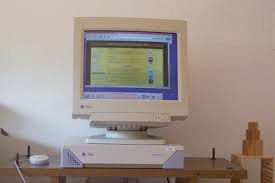
Sparc Station 4 - Sun 4 SPARC workstation
- Reynolds’ flocking behavior algorithm (Symbolics) (Ref: Reynolds, Craig W. Flocks, Herds and Schools: A Distributed Behavior Model. Computer Graphics (SIGGRAPH 87 Proceedings) 21(4) July 1987, p. 25-34.)
- Stanley and Stella in: Breaking the Ice
- Rob Cook receives the 1987 ACM SIGGRAPH CG Achievement Award
- Don Greenberg receives the 1987 ACM SIGGRAPH Steven A. Coons Award
- Advanced Computing Center for the Arts and Design (ACCAD) founded at Ohio State (formerly CGRG)
- Omnibus closes, eliminating DP and Abel
- Cranston/Csuri Productions closes
- Marching Cubes algorithm (Lorensen and Cline – GE) (Ref: Lorensen, William and Harvey E. Cline. Marching Cubes: A High Resolution 3D Surface Construction Algorithm. Computer Graphics (SIGGRAPH 87 Proceedings) 21(4) July 1987, p. 163-170. )
- Metrolight Studios, RezN8 Productions, Kleiser/Walczak Construction Co., DeGraf/Wahrman founded
1988
- PICT format (Apple)
- Apple sues Microsoft for copyright infringement for GUI
- GKS, PHIGS standards
- Prime Computer acquires Computervision
- Solid Texturing introduced (Perlin Noise Functions) (Ref: K. Perlin. An image synthesizer. Computer Graphics, 19(3):287–296, 1985)
- Al Barr receives the 1988 ACM SIGGRAPH CG Achievement Award
- Internet Worm infects servers all over the world
- Gary Demos founds DemoGraFX
- Open Software Foundation (OSF)
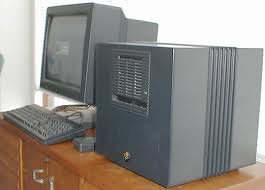
NeXT Cube - NeXT Cube – For $6500, it features: 25-MHz 68030 processor and 68882 math coprocessor, 8 MB RAM, 17-inch monochrome monitor, 256 MB read/write magneto-optical drive, and object-oriented NexTSTEP operating system.
- JCGL purchased by NAMCO
- US Patent awarded to Pixar for RenderMan
- Who Framed Roger Rabbit mixes live action and animation
- Willow (Lucasfilm) uses morphing in a feature film
- D-2 composite video format introduced by Ampex
- Disney and Pixar develop CAPS (Computer Animation Paint System) (academy technical award in 1992)
- PIXAR wins Academy award for Tin Toy
1989
- John Warnock receives the 1989 ACM SIGGRAPH CG Achievement Award
- David Evans receives the 1989 ACM SIGGRAPH Steven A. Coons Award
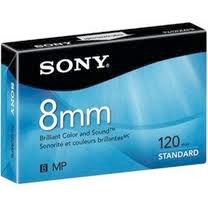
8mm Tape - 8MM videotape introduced by Sony
- Adobe Photoshop
- PHIGS+
- OSF Motif V1.0 released
- Intel 80486
- mental ray renderer released (integrated with Wavefront (1992), Softimage (1993), Maya (2002)) – awarded AMPAS Technical Achievement Award in 2002
- HP buys Apollo
- Computervision acquires Calma
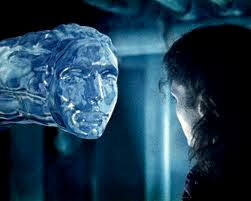
Abyss - ILM creates the Abyss
- PIXAR starts marketing RenderMan
1990s
1990
- Microsoft ships Windows 3.0
- NewTek Video Toaster
- First edition of Graphics Gems published by Academic Press (Andrew Glassner, editor)
- US Patent awarded to Pixar for point sampling
- Richard Shoup and Alvy Ray Smith receive the 1990 ACM SIGGRAPH CG Achievement Award
- 3D Studio (AutoDesk)
- Windows 3.0
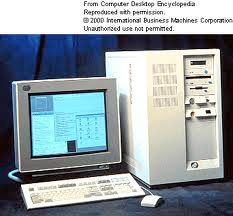
RS 6000 - IBM RS6000 workstation
- John Wiley & Sons begins publishing The Journal of Visualization and Computer Animation
1991
- World Wide Web (CERN)
- Jim Kajiya receives the 1991 ACM SIGGRAPH CG Achievement Award
- Andy van Dam receives the 1991 ACM SIGGRAPH Steven A. Coons Award
- Disney and PIXAR agree to create 3 films, including the first computer animated full-length film Toy Story
- ILM produces Terminator 2
- The Academy of Motion Pictures Arts and Sciences Special Achievement Award for Visual Effects for Total Recall (Metrolight Studios)
- Beauty and the Beast (Disney)
- Symbolics Graphics Division sold to Nichimen Graphics
- Motorola 68040
- Kodak PhotoCD
- JPEG/MPEG
- SunSoft – software subsidiary of Sun Microsystems
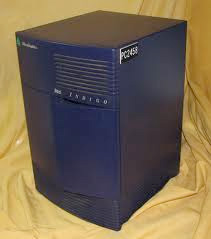
SGI Indigo - SGI Indigo workstation
- Disney (Randy Cartwright, David Coons, Lem Davis, Tom Hahn, Jim Houston, Mark Kimball, Dylan Kohler, Peter Nye, Mike Shaantzis, David Wolf) get Academy Scientific and Engineering Award for CAPS production system.
- Ray Feeney, Richard Keeney and Richard Lundell get Academy Scientific and Engineering Award for the Solitair Film Recorder .
1992
- QuickTime introduced (Apple)
- Henry Fuchs receives the 1992 ACM SIGGRAPH CG Achievement Award
- Softimage goes public
- SGI acquires MIPS
- OpenGL (SGI) released
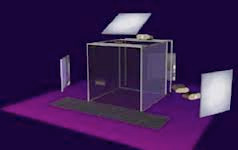
CAVE - University of Illinois debuts CAVE virtual reality technology at SIGGRAPH 92
- Lawnmower Man (Effects by Angel Studios and Xaos)
- US Patent awarded to Pixar for Non-Affine Image Warping
- VIFX uses flock animation with Prism software to create large groups of animals
- Jim Hourihan of Santa Barbara Studios develops willy into Dynamation, which will become a part of the Wavefront software system.
- Tom Brigham and Doug Smythe and ILM get Academy Technical Achievement Award for morphing technique (MORF)
- Loren Carpenter, Rob Cook, Ed Catmull, Tom Porter, Pat Hanrahan, Tony Apodaca and Darwyn Peachey get the Academy Scientific and Engineering Award for Renderman
- Novell buys UNIX from AT&T – $150M (transfers UNIX trademark to X/Open standards organization in 1993)
1993
- February (premiere) issue of DV magazine advises “[to be able to do digital video, get] the most souped up system you can get your hands on. A fast processor (68040 on Amiga or Mac, 80486 on PC) and lots of RAM (8-64 MB) are in order. So is a large hard drive (200 MB – 1 GB) if you want to take on serious production.”
- Disk array and compression codecs allow for nonlinear editing and full motion video
- Academy Scientific and Engineering Award is given to Les Dittart, Mark Leather, Doug Smythe and George Joblove for the development of the Digital Motion Picture Retouching System (rig removal and dirt cleanup)
- GPS system
-
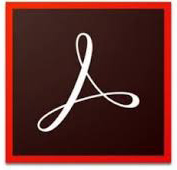
Adobe Acrobat - Adobe Acrobat
- Pat Hanrahan receives the 1993 ACM SIGGRAPH CG Achievement Award
- Ed Catmull receives the 1993 ACM SIGGRAPH Steven A. Coons Award
- Jurassic Park – ILM and Steven Spielberg
- Wavefront buys TDI
- Wired Magazine launched
- Windows NT
- Babylon 5 uses Amiga and Macintosh generated CGI
- Mosaic browser (NCSA)
- Xaos Tools Pandemonium image processor for the SGI
- Doom released
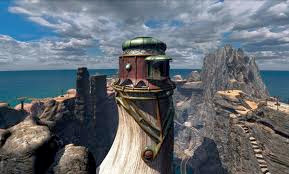
Myst - Myst released (Cyan) – in 1998, it became the top selling game of all time
- Digital Domain founded by James Cameron, Stan Winston, and Scott Ross
- 1994
- SGI and Nintendo team up for Nintendo 64 product
- ILM earns Oscar for special effects for Jurassic Park
- Microsoft acquires Softimage – announces Windows 95
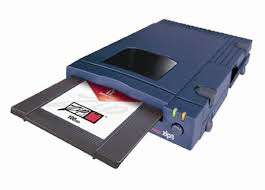
Iomega Zip Drive - Iomaga Zip drive
- Linux 1.0 released
- Reboot (CG cartoon) uses 3D characters (Mainframe Entertainment)
- Direct Broadcast Satellite service
- SGI founder Jim Clark resigns, forms Mosaic Communications
- Netscape browser
- VRML introduced (Mark Pesce)
- HDTV standard for transmission adopted in US
- The AMPAS Academy Award of Merit goes to Peter and Paul Vlahos for Ultimatte electronic blue screen compositing.
- Academy Scientific and Engineering Awards go to Gary Demos and Dan Cameron of III, David Difrancesco and Gary Starkweather of Pixar, and Scott Squires of ILM for pioneering work in film scanning; Lincoln Hu and Mike Mackenzie of ILM and Glenn Kennel and Mike Davis of Kodak for development work on a linear array CCD film input scanning system; and Ray Feeney, Will McCown and Bill Bishop of RFX and Les Dittert of PDI for their development work on an area array CCD film input scanning system
- Academy Technical Achievement Awards go to Mike Boudry of the Computer Film Company for pioneering work in film input scanning; and David and Lloyd Addleman for their inventions in digital image compositing.
- US Patent awarded to Pixar for creating, manipulating and displaying images

Super Mario - Facetracker used by SimmGraphics to animate facial expressions for Super Mario
- Ken Torrance receives the 1994 ACM SIGGRAPH CG Achievement Award
1995
- Toy Story (Pixar)
- DreamWorks SKG founded (Steven Spielberg, Jeffrey Katzenberg and David Geffen)
- DreamWorks SKG and Microsoft form DreamWorks Interactive
- Internet Explorer 2.0
- amazon.com established
- Academy Scientific and Engineering Award goes to Alvy Ray Smith, Ed Catmull, Tom Porter and Tom Duff (Pixar) for pioneering inventions in digital compositing.
- Academy Technical Achievement Awards go to Gary Demos, David Ruhoff, Dan Cameron and Michelle Feraud for creation of the Digital Productions digital film compositing system; the Computer Film Company for the CFC Digital Film Compositor; and Doug Smythe, Lincoln Hu,, Doug Kay and ILM for the ILM digital film compositing system.
- US Patent awarded to Pixar for image volume data
- John Lasseter of Pixar gets Academy Award for development and application of techniques used in Toy Story
- Kurt Akeley (SGI) receives the 1995 ACM SIGGRAPH CG Achievement Award
- Jose Encarnacao receives the 1995 ACM SIGGRAPH Steven A. Coons Award
- Wavefront and Alias merge
- Pixar goes public with 6.9M share offering
- Netscape IPO ($58.25/share)
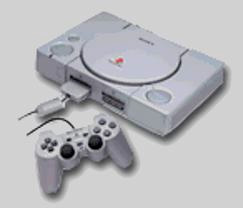
Playstation - Sony Playstation introduced
- Sun introduces Java
- Internet 2 unveiled
- MP3 standard format developed
- MSNBC debuts
1996
- John Whitney passes away (1922-1996)
- Quake hits game market
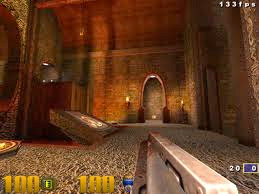
Quake - Macromedia buys FutureSplash Animator from FutureWave Technologies… it will become Flash.
- Marc Levoy receives the 1996 ACM SIGGRAPH CG Achievement Award
- Academy Scientific and Engineering Awards go to Jim Hourihan for particle systems in Dynamation; Brian Knep, Zoran Kacic-Alesic and Tom
- Williams of ILM for the Viewpaint 3D Paint system; and Bill Reeves for the original development and concept of particle systems.
- Academy Technical Achievement Awards go to Jim Kajiya of Cal Tech and Tim Kay for pioneering work in the creation of CGI hair and fur; Nestor Burtnyk and Marceli Wein of the National Research Center of Canada for computer assisted key framing for animation; Garth Dickie for shape-driven warping and morphing in the Elastic Reality Special Effects System; Jeff Yost, Christian Rouet, David Benson and Florian Kainz for the development of a system to create and control hair and fur in CGI; Brian Knep, Craig Hayes, Rick Sayre and Tom Williams of ILM for the creation and development of the direct input device; and Ken Perlin for the development of the Perlin Noise technique.
- Colossal Pictures files Chapter 11 bankruptcy
- Yahoo! IPO ($43/share)
- eBay launched
- SGI buys Cray Research – $764M
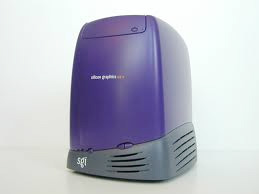
SGI O2 - SGI introduces O2 workstation
- Disney purchases DreamQuest Images; Dreamworks buys interest in PDI
- PalmPilot introduced
- Windows 95 ships
1997
- VIFX joins with Blue Sky
- Flash 1.0 released
- Bryce 3D
- Riven
- DVD technology unveiled
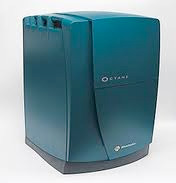
SGI Octane - SGI Octane
- IBM Deep Blue wins at chess
- Przemyslaw Prusinkiewicz receives the 1997 ACM SIGGRAPH CG Achievement Award
- James Foley receives the 1997 ACM SIGGRAPH Steven A. Coons Award
- Academy Scientific and Engineering Awards go to Bill Kovacs and Roy Hall for the engineering efforts that result in the Wavefront Advanced Visualizer software; Richard Shoup, Alvy Ray Smith and Tom Porter for the development of digital paint systems; John Gibson, Rob Kreiger, Milan Novacek, Glen Ozymok, and Dave Springer for the development of geometric modeling in Alias PowerAnimator; Craig Reynolds for pioneering contributions to 3D computer animation; Eben Ostby, Bill Reeves, Sam Leffler and Tom Duff for the Pixar Marionette animation system; and Dominique Boisvert, Rejean Gagne, Daniel Langlois, and Richard Lapierriere for the Actor component of the Softimage animation system.
- Academy Technical Achievement Awards go to Jim Keating, Michael Wahrman and Richard Hollander for the Wavefront Advanced Visualizer software development; Greg Hermanovic, Kim Davidson, Mark Elendt and Paul Breslin for the development of PRISMS software; and Richard Chuang, Glenn Entis and Carl Rosendahl for the PDI animation system.
- Pixar interactive division dissolved
- Microsoft sued by Justice Department
- Apple Computer acquires NeXT
1998
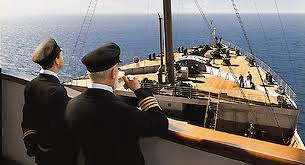
- Titanic becomes the largest grossing motion picture in US history
- Alias Maya released
- Quicktime 3.0 released
- Google launched
- Boss Films closes
- Riven released
- Sun gets back into graphics with the Darwin Ultra series of workstations
- MPEG-4 standard announced
- XML standard
- CGI cartoon Voltron produced in US
- SGI and Microsoft form partnership to develop APIs; SGI will develop NT-based PCs
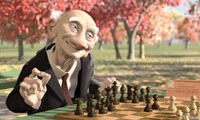
Scene from Geri’s Game - Geri’s Game (Pixar) – awarded the Academy Award for Animated Short
- Colossal Pictures emerges from Chapter 11 bankruptcy
- Avid purchases SoftImage from Microsoft
- The SIGGRAPH Conference celebrates its 25th Anniversary in Orlando. The Siggraph 98 History Project was established to review the history to that point.
- Carl Machover envisions a book that would be a compilation of significant papers in the history of CG. Edited by Rosalee Wolfe and titled Seminal Graphics: Pioneering Efforts that Shaped the Field, it started with a jury (Jim Blinn, Michael Cohen, Jim Foley, Don Greenberg, Machover, Stephen Spencer, and Turner Whitted) to select the “seminal” papers that would be included. The book was published in December.
- Jim Blinn delivers the SIGGRAPH 98 Keynote address
- Michael Cohen (Microsoft) receives the 1998 ACM SIGGRAPH CG Achievement Award
- Maxine Brown receives the first SIGGRAPH Outstanding Service Award
- Academy Technical Achievement Awards go to Doug Roble (Digital Domain) and Thad Beier (Hammerhead) for Tracking Technology; Nick Foster (PDI) for water simulation systems; David Difrancesco, Bala Manian and Tom Noggle for laser film recording and Cary Philips for the ILM Caricature animation system
- Academy Scientific and Engineering Awards go to Gary Tregaski for the primary design and Dominique Boisvert, Philipe Panzini and Andre Leblanc for the development of the Flame and Inferno software; Roy Ference, Steve Schmidt, Richard Federico, Rockwell Yarid and Mike McCrackan for the design and development of the Kodak Lightning laser recorder.
1999
- The graphics world loses David Evans at age 74
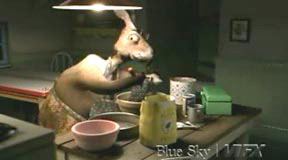
Scene from Bunny - Bunny (Chris Wedge – Blue Sky) – awarded the Academy Award for Animated Short
- Star Wars Episode One – The Phantom Menace uses 66 digital characters composited with live action
- VIFX and Rhythm & Hues merge
- The graphics world loses Pierre Bezier
- Silicon Graphics Incorporated changes its name to SGI
- Fred Brooks receives the Turing Award
- NewTek ports Toaster to NT
- melissa computer virus
- SIGGRAPH celebrates its 30th Anniversary as an organization at SIGGRAPH 99 in Los Angeles
- Tony DeRose (Pixar) receives the 1999 ACM SIGGRAPH CG Achievement Award
- Jim Blinn receives the 1999 ACM SIGGRAPH Steven A. Coons Award
- SGI cuts Cray, NT production and High end graphic design
- Side Effects Houdini ported to Linux
- Napster created
- Toy Story 2 produced by Pixar
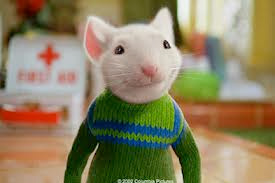
Stuart Little - Stuart Little produced by Sony Pictures Imageworks
- Fantasia 2000 produced by Disney
- Disney’s DreamQuest and Feature Animation join to form The Secret Lab (TSL)
2000s
2000
- Playstation 2
- SGI sells Cray to Tera Computer
- Human genome mapped by Celera
- Microsoft X-Box prototype shown at SIGGRAPH 2000
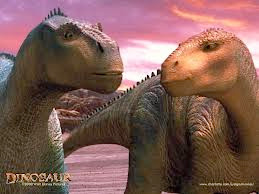
Dinosaur - Dinosaur produced by Disney
- The graphics world loses Phil Mittleman (MAGI)
- Walking with Dinosaurs – Framestore (UK)
- Mission to Mars effects produced by ILM and The Secret Lab
- Academy of Motion Pictures Arts and Sciences Award of Merit awarded to Rob Cook, Loren Carpenter and Ed Catmull for the significant advancements to the field of motion picture rendering as exemplified in Pixar’s Renderman
- Academy Technical Achievement Awards go to Venkat Krishnamurthy for the Paraform software for digital form development; and George Burshukov, Kim Libreri and Dan Piponi for image based rendering
- SIGGRAPH 2000 held in New Orleans
- Tom DeFanti and Copper Giloth receive the 2000 SIGGRAPH Outstanding Service Award
- David Salesin receives the 2000 ACM SIGGRAPH CG Achievement Award
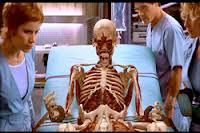
Hollowman - Hollow Man produced by Sony Pictures Imageworks
- How the Grinch Stole Christmas (Centropolis)
- Maya ported to Macintosh
- Mac OS-X introduced
2001
- SIGGRAPH 2001 held in Los Angeles
- Lance Williams receives the 2001 ACM SIGGRAPH Steven A. Coons Award
- Andrew Witkin receives the 2001 ACM SIGGRAPH CG Achievement Award
- Paul Debevec receives the 2001 ACM SIGGRAPH Significant New Researcher Award
- The graphics world loses Bob Abel (Sept 23)
- Disney’s Secret Lab closes
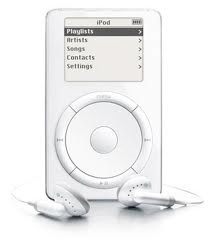
iPod - Apple iPod
- Side Effects Houdini ported to Sun
- AOL/TimeWarner merger
- Autodesk acquires Media100 software product line
- Advanced Audio Coding (AAC) format introduced by Dolby Labs and Fraunhofer Institute
- Windows XP
- Academy Technical Achievement Awards go to Garland Stern for the Cel Paint software system; Uwe Sassenberg and Rolf Schneider for the 3D Equalizer matchmove system; Lance Williams for pioneering influence in animation and effects; Bill Spitzak, Paul Van Camp, Jonathan Egstad and Price Pethal for the NUKE-2D compositing software; Steve Sullivan and Eric Shafer for the ILM Motion and Structure Recovery System (MARS); and John Anderson, Jim Hourihan, Cary Philips and Sebastion Marino for the ILM Creature Dynamics System
- The Academy of Motion Pictures Arts and Sciences approve a new category for the Oscars titled Best Animated Feature Film Award. Nine films were declared eligible: Final Fantasy: The Spirits Within, Jimmy Neutron: Boy Genius, Marco Polo: Return to Xanadu, Monsters, Inc., Osmosis Jones, The Prince of Light, Shrek, The Trumpet of the Swan, and Waking Life.
- Significant FX movies – Final Fantasy (Square), Monsters Inc.(Pixar), Harry Potter, A.I., Lord of the Rings, Shrek (PDI), The Mummy Returns (ILM), Tomb Raider (Cinesite), Jurassic Park III, Pearl Harbor (ILM), Planet of the Apes (Asylum)

xBox - Microsoft xBox and Nintendo Gamecube released
2002
- SIGGRAPH 2002 held in San Antonio, Texas
- Bert Hertzog (Fraunhofer Center for Research in Computer Graphics) receives the 2002 Outstanding Service Award for extraordinary service to ACM SIGGRAPH by a volunteer
- David Kirk (NVIDIA) receives the 2002 ACM SIGGRAPH CG Achievement Award
- HP / Compaq merger
- William Fetter (Boeing) passes away.
- Steven Gortler (Harvard Univ) receives the 2002 ACM SIGGRAPH Significant New Researcher Award
- Alias|Wavefront, an SGI company, was awarded an Academy Award of Merit Oscar at the Scientific and Technical Awards ceremony of the Academy of Motion Picture Arts and Sciences for its development of Maya software.
- Mark Elendt, Paul Breslin, Greg Hermanovic and Kim Davidson receive a Scientific and Engineering Award for their continued development of the procedural modeling and animation components of their Prisms program, as exemplified in the Houdini software package.
- Academy Technical Achievement Awards To Dick Walsh for the development of the PDI/ Dreamworks Facial Animation System. To Thomas Driemeyer and to the mathematicians, physicists and software engineers of Mental Images for their contributions to the Mental Ray rendering software for motion pictures. To Eric Daniels ,George Katanics ,Tasso Lappas and Chris Springfield for the development of the Deep Canvas rendering software.
2003
- Atari Games Corporation (Midway Games West) out of business.
- Oscar nominees for Best animated short film: The Cathedral, Platige Image, Tomek Baginski; The Chubb Chubbs!, Sony Pictures Imageworks,Eric Armstrong; Das Rad, Filmakademie Baden-Württemberg GmbH, Chris Stenner and Heidi Wittlinger; Mike’s New Car, Pixar Animation Studios,Pete Docter and Roger Gould; Mt. Head, Yamamura Animation Production, Koji Yamamura; for Achievement in visual effects: The Lord of the Rings: The Two Towers, Jim Rygiel, Joe Letteri, Randall William Cook and Alex Funke; Spider-Man, John Dykstra, Scott Stokdyk, Anthony LaMolinara and John Frazier, Star Wars Episode II: Attack of the Clones, Rob Coleman, Pablo Helman, John Knoll and Ben Snow;Ice Age nominated for Best Animated Feature Film
- Dolby Labs acquires DemoGraFX, Gary Demos’ company
- SIGGRAPH 2003 held in San Diego
- David Brown (founder – Blue Sky and ex of MAGI) passes away
- Pat Hanrahan (Stanford) receives the 2003 ACM SIGGRAPH Steven A. Coons Award
- Peter Schrøder (Cal Tech) receives the 2003 ACM SIGGRAPH CG Achievement Award
- Mathieu Desbrun (USC) receives the 2003 ACM SIGGRAPH Significant New Researcher Award
- The Cathedral selected as Best Short Film in SIGGRAPH Electronic Theatre

PowerMac G5 - Apple introduces the Power Mac G5
- Alias/Wavefront becomes Alias
2004
- Jim Clark elected to Fellow in Academy of Arts and Sciences
- Oscar nominees for Best animated short film: Harvie Krumpet – Adam Elliot; Boundin’ – Bud Luckey; Destino – Dominique Monfery, Roy Edward Disney; Gone Nutty – Carlos Saldanha, John C. Donkin; Nibbles – Christopher Hinton; for Best animated feature : Finding Nemo – Andrew Stanton; Brother Bear – Aaron Blaise, Robert Walker; Triplettes de Belleville, Les – Sylvain Chomet; for Achievement in Visual Effects: Lord of the Rings: The Return of the King – Jim Rygiel, Joe Letteri, Randall William Cook, Alex Funke; Master and Commander: The Far Side of the World – Daniel Sudick, Stefen Fangmeier, Nathan McGuinness, Robert Stromberg; Pirates of the Caribbean: The Curse of the Black Pearl – John Knoll, Hal T. Hickel, Charles Gibson, Terry D. Frazee
- Academy Scientific and Engineering Awards go to Stephen Regelous for the design and development of Massive, the autonomous agent animation system used for the battle sequences in “The Lord of the Rings” trilogy. Academy Technical Achievement Awards go to Christophe Hery, Ken McGaugh, and Joe Letteri for their groundbreaking implementations of practical methods for rendering skin and other translucent materials using subsurface scattering techniques; Henrik Wann Jensen, Stephen R. Marschner, and Pat Hanrahan for their pioneering research in simulating subsurface scattering of light in translucent materials as presented in their paper “A Practical Model for Subsurface Light Transport.”
- SIGGRAPH 2004 held in Los Angeles
- Steve Cunningham and Judith Brown receive the 2004 Outstanding Service Award for extraordinary service to ACM SIGGRAPH by a volunteer
Hugues Hoppe (Microsoft) receives the 2004 ACM SIGGRAPH CG Achievement Award - Zoran Popovic (Univ. Washington) receives the 2004 ACM SIGGRAPH Significant New Researcher Award
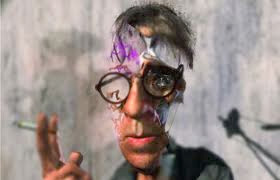
Ryan - Chris Landreth’s Ryan selected for Jury Award in SIGGRAPH Electronic Theatre; Sejong Park’s Birthday Boy selected Best Animated Short
- Ub Iwerks Award given to Ed Catmull for creative work at Pixar
- Alias acquired from SGI by Accel-KKR and the Ontario Teachers’ Pension Plan.
2005
- Oscar nominees for Best animated short film: Sejong Park & Andrew Gegory – Birthday Boy; Jeff Fowler & Tim Miller – Gopher Broke; Bill Plympton – Guard Dog; Mike Gabriel & Baker Bloodworth – Lorenzo; Chris Landreth – Ryan; for Best animated feature : Brad Bird – The Incredibles; Bill Damasschka – Shark Tale; Andrew Adamson – Shrek 2; for Achievement in Visual Effects: Roger Guyett, Tim Burke, John Richardson and Bill George – Harry Potter and the Prisoner of Azkaban; John Nelson, Andrew R. Jones, Erik Nash and Joe Letteri – I, Robot; John Dykstra, Scott Stokdyk, Anthony LaMolinara and John Frazier – Spider-Man 2
- Academy Scientific and Technical Awards go to Dr. Julian Morris, Michael Birch, Dr. Paul Smyth and Paul Tate for the development of the Vicon motion capture technology; Dr. John O. B. Greaves, Ned Phipps, Antonie J. van den Bogert and William Hayes for the development of the Motion Analysis motion capture technology; Dr. Nels Madsen, Vaughn Cato, Matthew Madden and Bill Lorton for the development of the Giant Studios motion capture technology; Alan Kapler for the design and development of Storm , a software toolkit for artistic control of volumetric effects.
- SIGGRAPH 2005 held in Los Angeles
- Steve Cunningham and Judith Brown receive the 2004 Outstanding Service Award for extraordinary service to ACM SIGGRAPH by a volunteer
Tomoyuki Nishita (Tokyo University) receives the 2005 ACM SIGGRAPH Steven Anson Coons Award - Jos Stam (Alias) receives the 2005 ACM SIGGRAPH CG Achievement Award
- Ron Fedkiw (Stanford) receives the 2005 ACM SIGGRAPH Significant New Researcher Award
- Shane Acker’s 9 selected for Best of Show in SIGGRAPH Electronic Theatre; Fallen Art and La Migration Bigoudenn selected for Jury Honors
- Steve Cunningham and Judith Brown receive the 2004 Outstanding Service Award for extraordinary service to ACM SIGGRAPH by a volunteer
- Adobe purchases Macromedia for US$3.4B.
2006
- Oscar nominees for Best animated short film: “Badgered” – A National Film and Television School Production, Sharon Colman; “The Moon and the Son: An Imagined Conversation” – A John Canemaker Production, John Canemaker and Peggy Stern; “The Mysterious Geographic Explorations of Jasper Morello” (Monster Distributes) – A 3D Films Production, Anthony Lucas; “9” – A Shane Acker Production, Shane Acker; “One Man Band” – A Pixar Animation Studios Production, Andrew Jimenez and Mark Andrews. for Best animated feature : “Howl’s Moving Castle” (Buena Vista) – Hayao Miyazaki; “Tim Burton’s Corpse Bride” (Warner Bros.) – Mike Johnson and Tim Burton; “Wallace & Gromit in the Curse of the Were-Rabbit” (DreamWorks Animation SKG) – Nick Park and Steve Box. for Achievement in Visual Effects: “The Chronicles of Narnia: The Lion, the Witch and the Wardrobe” (Buena Vista) – Dean Wright, Bill Westenhofer, Jim Berney and Scott Farrar; “King Kong” (Universal) – Joe Letteri, Brian Van’t Hul, Christian Rivers and Richard Taylor; “War of the Worlds” (Paramount and DreamWorks) – Dennis Muren, Pablo Helman, Randal M. Dutra and Daniel Sudick
- Academy Scientific and Technical Awards go to David Baraff, Michael Kass and Andrew Witkin for their pioneering work in physically-based computer-generated techniques used to simulate realistic cloth in motion pictures.; to John Platt and Demetri Terzopoulos for their pioneering work in physically-based computer-generated techniques used to simulate realistic cloth in motion pictures; to Ed Catmull, for the original concept, and Tony DeRose and Jos Stam for their scientific and practical implementation of subdivision surfaces as a modeling technique in motion picture production. Gary Demos was honored with the 19th Gordon E. Sawyer Award, presented to an individual in the motion picture industry whose technological contributions have brought credit to the industry.
- Disney acquires Pixar for $7.4B; Ed Catmull named President; Steve Jobs joins Disney Board
- Apple Computer adopts the Intel chip, introduces Bootcamp to run Windows.
- SGI files Chapter 11 protection
- Richard “Doc” Bailey, the “Jimi Hendrix of CG” passes away
- Michael Bay and Wyndcrest Holdings buy Digital Domain, replace Scott Ross
- SIGGRAPH 2006 held in Boston. SIGGRAPH awards are as follows:
- Computer Graphics Achievement Award Thomas W. Sederberg, Brigham Young University
- Significant New Researcher Award Takeo Igarashi, The University of Tokyo
- ACM SIGGRAPH Outstanding Service Award John M. Fujii, Hewlett Packard Company
- One Rat Short – Best of Show, Computer Animation Festival Alex Weil, Charlex Inc.
- CGI pioneer Bill Kovacs passes away.
- AMD purchases ATI Technologies for $5.4B
- Autodesk acquires Alias for US$197M.
2007
- SIGGRAPH 2007 held in San Diego. SIGGRAPH awards are as follows:
- Computer Graphics Achievement Award – Greg Ward (Radiance)
- Significant New Researcher Award – Ravi Ramamoorthi
- Steven Coons Award – Nelson Max
- Ark – Best of Show, Computer Animation Festival; Dreammaker – Jury Honors; En Tus Brazos – Award of Excellence
- Academy Award nominations for Animated feature: Ratatouille (Disney/Pixar) – Brad Bird, Persepolis (Sony Pictures Classics) – Marjane Satrapi and Vincent Paronnaud, Surf’s Up (Columbia/Sony Pictures Animation) – Ash Brannon and Chris Buck. For Animated Short: Peter & the Wolf – Se-ma-for, BreakThru Films – Suzie Templeton, Even Pigeons Go To Heaven – BUF – Samuel Tourneux and Simon Vanesse, I Met the Walrus – Josh Raskin, Madame Tutli-Putli – National Film Board of Canada – Chris Lavis and Maciek Szczerbowski, My Love – Aleksandr Petrov. For Visual Effects: The Golden Compass – Michael Fink, Bill Westenhofer, Ben Morris, and Trevor Wood, Pirates of the Caribbean: At World’s End – John Knoll, Hal Hickel, Charles Gibson, and John Frazier, Transformers – Scott Farrar, Scott Benza, Russell Earl, and John Frazier.
2008
- SIGGRAPH 2008 held in Los Angeles. SIGGRAPH awards are as follows:
- Computer Graphics Achievement Award – Ken Perlin
- Significant New Researcher Award – Maneesh Agrawala
- ACM SIGGRAPH Outstanding Service Award – Stephen Spencer, University of Washington
- Oktapodi – Best of Show; 893 – Best Student Piece; Mauvais Role – Jury Award; Our Wonderful Nature – Best Told Fable; Oktapodi – Audience Prize Computer Animation Festival
- Academy Award nominations for Animated feature: WALL-E (Disney/Pixar) – Andrew Stanton, Bolt (Disney) – Chris Williams and Byron Howard, Kung Fu Panda (DreamWorks/Pacific Data Images) – John Wayne Stevenson and Mark Osborne. For Animated Short: La Maison en petits cubes – Robot & Oh! Production – Kunio Katō, Lavatory – Lovestory – Melnitsa Animation Studio – Konstantin Bronzit, Oktapodi – Gobelins L’Ecole de L’Image – Emud Mokhberi and Thierry Marchand, Presto – Pixar – Doug Sweetland, This Way Up – Nexus Productions – Alan Smith and Adam Foulkes. For Visual Effects: The Curious Case of Benjamin Button – Eric Barba, Steve Preeg, Burt Dalton, and Craig Barron, The Dark Knight – Nick Davis, Chris Corbould, Tim Webber, and Paul Franklin, Iron Man – John Nelson, Ben Snow, Dan Sudick, and Shane Mahan
2009
- SIGGRAPH 2009 held in New Orleans. SIGGRAPH awards are as follows:
- Computer Graphics Achievement Award – Michael Kass
- Significant New Researcher Award – Wojciech Matusik
- Stephen A. Coons Award – Robert Cook
- Distinguished Artist Award for Lifetime Achievement in Digital Art – Lynne Hershman Leeson, Roman Verostko
- French Roast – Best of Show; Project: Alpha – Best Student Piece; Dix – Jury Award; Unbelievable Four – Best Told Fable, Computer Animation Festival
- Academy Award nominations for Animated feature: Up (Disney/Pixar) – Pete Docter, Coraline (Focus Features/LAIKA) – Henry Selick, Fantastic Mr. Fox (20th Century Fox/Regency) – Wes Anderson, The Princess and the Frog (Disney) – John Musker and Ron Clements, The Secret of Kells (Cartoon Saloon) – Tomm Moore and Nora Twomey. For Animated Short: Logorama – H5, Autour de Minuit Productions – Nicolas Schmerkin, Granny O’Grimm’s Sleeping Beauty – Brown Bag Films – Nicky Phelan and Darragh O’Connell, French Roast – Fabrice Joubert, The Lady and the Reaper – Kandor Graphics – Javier Recio Gracia, A Matter of Loaf and Death – Aardman Animations – Nick Park. For Visual Effects: Avatar – Joe Letteri, Stephen Rosenbaum, Richard Baneham, and Andrew R. Jones, District 9 – Dan Kaufman, Peter Muyzers, Robert Habros, and Matt Aitken, Star Trek – Roger Guyett, Russell Earl, Paul Kavanagh, and Burt Dalton
- Significant animated movies: 9 (USA), A Christmas Carol (USA), Afro Samurai: Resurrection (USA and Japan), Alvin and the Chipmunks: The Squeakquel (USA), Astro Boy (USA and Japan), Cloudy with a Chance of Meatballs (USA), Coraline (USA), Fantastic Mr. Fox (USA), Garfield’s Pet Force (USA and South Korea), Ice Age 3: Dawn of the Dinosaurs (USA), Monsters vs. Aliens (USA), Up (USA)
2010
- SIGGRAPH 2010 held in Los Angeles. SIGGRAPH awards are as follows:
- Computer Graphics Achievement Award Jessica Hodgins
- Significant New Researcher Award – Alexei Efros
- ACM SIGGRAPH Outstanding Service Award Kellogg S. Booth
- Distinguished Artist Award for Lifetime Achievement in Digital Art – Yoichiro Kawaguchi
- Loom – Best of Show; Best Student Piece – The Wonder Hospital; Jury Award – Poppy, Computer Animation Festival
- Academy Award nominations for Animated feature: Toy Story 3 (Disney/Pixar) – Lee Unkrich, How to Train Your Dragon (DreamWorks/Pacific Data Images) – Chris Sanders and Dean DeBlois, The Illusionist (Pathé Pictures/Sony Pictures Classics) – Sylvain Chomet. For Animated Short: The Lost Thing – Shaun Tan and Andrew Ruhemann, Day & Night – Pixar – Teddy Newton, The Gruffalo – Magic Light Pictures, Studio Soi – Jakob Schuh and Max Lang, Let’s Pollute – Geefwee Boedoe, Madagascar, a Journey Diary – Bastien Dubois.
- For Visual Effects: Inception – Paul Franklin, Chris Corbould, Andrew Lockley and Peter Bebb, Alice in Wonderland – Ken Ralston, David Schaub, Carey Villegas and Sean Phillips, Harry Potter and the Deathly Hallows: Part 1 – Tim Burke, John Richardson, Christian Manz and Nicolas Aithadi, Hereafter – Michael Owens, Bryan Grill, Stephan Trojanski and Joe Farrell, Iron Man 2 – Janek Sirrs, Ben Snow, Ged Wright and Daniel Sudick
- Significant animated movies: Alpha and Omega (USA), Despicable Me (USA), MegaMind (USA), Shrek Forever After (USA), Tangled (USA), Tinker Bell And The Great Fairy Rescue (USA), Toy Story 3 (USA).
2011
- SIGGRAPH 2011 held in Vancouver. SIGGRAPH awards are as follows:
- Computer Graphics Achievement Award – Richard Szeliski
- Significant New Researcher Award – Olga Sorkine
- Stephen A. Coons Award – Jim Kajiya
- Distinguished Artist Award for Lifetime Achievement in Digital Art – Charles Csuri
- The Fantastic Flying Books of Mr. Morris Lessmore – Best of Show; Flamingo Pride – Best Student Piece; Paths of Hate – Jury Award, Computer Animation Festival
- Academy Award nominations for Animated feature: Rango (Paramount Pictures/Nickelodeon Movies/Blind Wink/GK Films) – Gore Verbinski, A Cat in Paris (Folimage with Digit Anima, France 3 Cinéma, Lumière, Lunanime, Radio Télévision Belge Francophone) – Alain Gagnol and Jean-Loup Felicioli, Chico & Rita (Isle of Man Film/Magic Light Pictures/Disney/CinemaNX) – Fernando Trueba and Javier Mariscal, Kung Fu Panda 2 (DreamWorks Animation/Paramount Pictures) – Jennifer Yuh Nelson, Puss in Boots (DreamWorks Animation/Paramount Pictures) – Chris Miller.
- For Animated Short: The Fantastic Flying Books of Mr. Morris Lessmore – Moonbot Studios – William Joyce and Brandon Oldenburg, Dimanche – National Film Board of Canada – Patrick Doyon, La Luna – Pixar – Enrico Casarosa, A Morning Stroll – Studio AKA – Grant Orchard and Sue Goffe, Wild Life – National Film Board of Canada – Wendy Tilby and Amanda Forbis.
- For Visual Effects: Hugo – Rob Legato, Joss Williams, Ben Grossmann and Alex Henning, Harry Potter and the Deathly Hallows: Part 2 – Tim Burke, David Vickery, Greg Butler, and John Richardson, Real Steel – Erik Nash, John Rosengrant, Danny Gordon Taylor, and Swen Gillberg, Rise of the Planet of the Apes – Joe Letteri, Dan Lemmon, R. Christopher White, and Daniel Barrett, Transformers: Dark of the Moon – Scott Farrar, Scott Benza, Matthew E. Butler, and John Frazier
- Significant animated movies: Arthur Christmas (USA), Cars 2 (USA), Gnomeo and Juliet (USA/UK), Happy Feet 2 (USA/Australia), Hop (USA), Kung Fu Panda 2 (USA), Puss in Boots (USA), Rango (USA, Rio (Brazil and USA), The Adventures of Tintin: Secret of the Unicorn (USA, The Smurfs (USA).
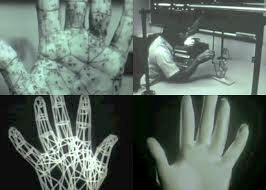
Catmull’s Hand - Ed Catmull’s CG Hand added to National Film Registry
2012
- Carl Machover, computer graphics pioneer and graphics “evangelist”, dies at 84.
- Buzz Potamkin, legendary animation producer (“I Want My MTV”) and head of Buzzco Productions dies at 66.
- Digital Domain files for Chapter 11 and closes all Florida studios; emerges from bankruptcy after selling to Galloping Horse America, a division of a Beijing media company, and Reliance MediaWorks, part of the Indian conglomerate Reliance Group in late September for $30.2M
- SIGGRAPH 2012 held in Los Angeles. SIGGRAPH awards are as follows:
- Computer Graphics Achievement Award – Greg Turk
- Significant New Researcher Award – Karen Liu
- Outstanding Service Award – David Kasik
- Distinguished Artist Award for Lifetime Achievement in Digital Art – Jean-Pierre Hébert
- Réflexion – Best in Show; Estefan – Best Student Piece; How To Eat Your Apple – Jury Award,, Rosette – Well Told Fable Award – Computer Animation Festival
2013
- Rhythm and Hues files for bankruptcy (February) – Purchased by Prana Studios (April)
- SIGGRAPH 2013 held in Anaheim. SIGGRAPH awards are as follows:
- Computer Graphics Achievement Award – Holly Rushmeier
- Steven Anson Coons Award – Turner Whitted
- Significant New Researcher Award – Niloy Mitra
- Distinguished Artist Award for Lifetime Achievement in Digital Art – Manfred Mohr
- Outstanding Service Award – Mary Whitton
- À la Française – Best in Show; Rollin’ Safari – Best Student Piece; Lost Senses – Jury Award, – Computer Animation Festival
